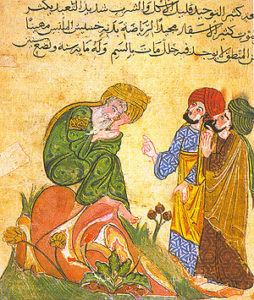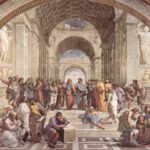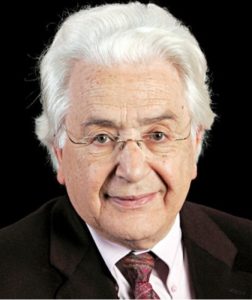
Let us now pause a little and consider the great intellectual movement that influenced Arab Islamic thought for a number of centuries before such time as intellect and reason were entirely crushed by the Hanbalīs: the Muʽtazila school. Arkoun sees that there are two main premises that should guide our view when we consider the study of this famous intellectual movement in the history of Islam.
BY HASHEM SALEH
THE FIRST IS that there was no single intellectual school of thought either in Basra or later in Baghdad that embraced a single consistent doctrine or went under the name Muʽtazila. Instead there are several personalities with different characteristics and intellectual standpoints. Even so, all of them subscribe to Muʽtazilī views. For example, as regards the crucial issue of the caliphate or the imamate we notice that ‘Amr ibn al-ʽUbayd, al-Jāhiz and Thamāma were supporters of Abū Bakr while al-Jubā’ī and Bashar ibn al-Muʽtamar and al-Iskāfī were partisans of ʽAlī ibn Abī Tālib and consider him the true heir to the caliphate. Consequently the Muʽtazila was a pluralistic movement and accepted the right of difference amongst its members, even in such serious matters as these, at a time when Muslims were deeply divided on the issue of the succession to the Prophet.
The second premise that we have to take into consideration when we study this important intellectual current concerns its relationship with philosophy. There is no disputing that the intellectual capacities of the Muʽtazila improved when they transferred from Basra to Baghdad and embarked on the study of Greek philosophy. At that point there was an agreement between all currents of the Muʽtazila on a number of basic principles that constituted their common denominators: Divine Unity (tawhīd), Divine Justice[1], the Promise and the Warning[2], the Intermediate Position[3], the Promotion of Good and the Prohibition of Evil.
Perhaps the decline of the Muslim world was its abandonment of Muʽtazila theology
Scholars are of the opinion that the first to formulate these principles representing the doctrine of the Muʽtazila was Abū Hudhayl al-ʽAllāf in his work Kitāb al-Hujaj (‘The Book of Proofs’). Here the originality, rationality and intellectual courage of the Muʽtazila is manifest in comparison with all other Islamic denominations. For to a large extent they set the intellect free from the domination of orally transmitted knowledge, that is, from sacralised religious heritage. Starting from that date the antithesis between rational sciences or ‘rationalities’ as it was expressed, and the ‘acoustic’ sciences, became pivotal in the history of Islam. It became a reliable touchstone which one could use to classify thinkers and all cultural and intellectual activity, so now we say ‘this is an intellectual thinker’ or ‘this is an oral or traditional thinker’ who is merely content to repeat the religious sentiments he has heard and which impose themselves upon the intellect.
The greatness of the Muʽtazila lies in the fact that they focused upon two basic ideas: the singularity of God and His justice, so that they are often termed the ‘Monotheism and Justice People’. They then added to these two categories a third concept concerned with human will: the responsibility of man for his own actions whereby God is not responsible for the evil deeds that men do. God forbid! For He can produce nothing but that which is purely good. They therefore they flatly refused the argument that had taken root among the traditional thinkers, that what is fated to happen, be it good or evil, comes from God Almighty. The Muʽtazila, and all those with sound senses, found such a thing very shocking: for how in that case could one even associate the idea of evil with God? It would contradict all logic and reason. Even so, this is the argument that has taken root in the Islamic world, or at least over the large part of it, to the present-day. This dictum is taught in every Arab madrassa as if it were some divine directive untouched by doubt!
The takfīr of the intellect in Islam has been going on for a millennium
Perhaps the decline of the entire Arab and Muslim world can therefore be ascribed to its abandonment of the responsible, rationalising theology of the Muʽtazila and its adoption of the theology of fatalistic indifference of its opponents, who do not believe in the idea of causality nor of human responsibility. Herein lies the first flaw that beset the Arab Islamic mind and for which they are paying the price to this day.
Mohamed Arkoun believes that Ibrāhīm al-Nizām the teacher of al-Jāhiz who died in 231 AH (846 AD) was an example of a typical Muʽtazilī thinker, one whom Sunni thinkers have failed to understand or accord his true worth. Take, for example, what some heresiographs such as al-Baghdādī and al-Shahristānī said of him – the latter accused him of introducing heresies into Islam or even of warring against it altogether! And what is the reason for this view? Because they differed with some of the statements of the Sunnis. As for contemporary Salafists, they have declared him an ‘infidel’ and accused him of heresy, even though in point of fact he was a true Muslim and a great rationalist at one and the same time.
He had made strenuous attempts to formulate a strict monotheistic current founded upon both reason and the Qur’ān. He erected a strong bulwark against the torrent of prophetic hadith of dubious veracity that was appearing, and at the same time opened his mind to knowledge, even if he found this in Greek philosophy. He also fought a bitter war on two fronts: on the one hand against dualists and freethinkers or atheists, and on the other hand against the Hanbalīs and the scholars of the hadith and proponents of blind tradition. For this very reason a contemporary Salafist figurehead, Shaykh Safar al-Hawālī, declared him to be an infidel:
Some of these heretics have declared themselves as such, while others such as the prominent Muʽtazilīs such as Hudhayl ibn al-ʽAllāf and Ibrāhīm al-Nizām have not been unmasked. These were heretics and indeed al-Jāhiz may also be counted a heretic for his epistles bear witness to this, God preserve us![4]
Notice how all the prominent figures of the Islamic nation have become ‘infidels’ and ‘heretics’, al-Jāhiz included! In fact this Salafist shaykh added to the list of condemned Muʽtazilī figures such personalities as al-Maʽarrī, al-Hallāj, Ibn ʽArabī and others too. All the geniuses of the Muslim nation have now become infidels! This is a truly fearful thing; the takfīr of the intellect in Islam has been going on for a millennium and continues today – and they call this the ‘Islamic Awakening’! If this constitutes an awakening, then what should one call all of this slumber and somnolence to history? It all simply means that the resurgence of this nation will not occur tomorrow nor the day after tomorrow, particularly if these Salafist opponents to science, philosophy and reason persist in propagating their isolationist – not to say terrorist – views on religious satellite channels and educational syllabuses throughout the Arab world.
Regrettably the thesis of the created Qur’ān was virtually stillborn
Mohamed Arkoun, in contradistinction to these ancient and latter-day Salafists, pays tribute to the Muʽtazila and their famous proposals on the created nature of the Qur’ān. Why does he do this? Because they made the holy text a message that was precisely definable historically and something whose symbols could be linguistically decoded and interpreted. They opposed the Hanbalīs’ obscurantist, ahistorical thesis, and made the Qur’ānic text something accessible to the human mind with a capacity to understand it and interpret it. The Hanbalī proposition, of course, totally demolished the historicity of the Qur’ān or placed it entirely ‘above’ history, and this thesis still prevails over the mentality of Muslims today. It constitutes the greatest obstacle to the emancipation of Muslims from the takfirist mindset of the Middle Ages. Had the Muʽtazila thesis succeeded and prevailed we would find it so much easier to undertake the historical interpretation of the Qur’ān, just as the great Orientalists have been doing in foreign languages.
Regrettably, however, the thesis of the created Qur’ān was virtually stillborn and has not been able to stand on its feet for a thousand years. This gives us an idea of the crushing defeat sustained by the mind in Islam and at the same time explains the reason for the backwardness of Muslims and the advance of everyone else.[5] In addition, the Muʽtazilīs’ insistence upon the responsibility of man for his acts favoured the emergence of a free and independent person in Islam. But here too their thesis was aborted, to be replaced by the Ashʽarī thesis of kasb (‘acquisition’)[6], that is, that God is the one responsible for all human acts, be they good or evil, and that mankind is not possessed of any free will, and that consequently he is, in the end, not responsible for his actions. Whatever befalls one, for good or for ill, therefore comes from God Almighty!

Suggested Reading
Al-Ashʽarī then cancelled out the idea of causality, something which is the foundation of all science and reason. Al-Ghazālī followed in his wake, as is well known, and thus verse became chapter and the self isolation of the Islamic world, and the suppression of the intellect and rationality, became complete. We are heirs to all this in our educational programs and in the fatalistic indifference of our individual thoughts, and indeed in the way we live our daily lives.
How then can we rise again and catch up with the advanced nations? How can we rid ourselves of the mentality of takfīr and high explosives? How can we pick up the missing pieces and escape the huge bottleneck we are stumbling about in today?
[1] That is, the essential justice of God, who is incapable of doing anything ultimately evil (Ed.)
[2] That is, God cannot act contrary to His promise of reward to those who follow Him and who respond to His imperative towards knowledge of Him and of truth; nor can He act contrary to His punishment for those who choose a varying principle of conduct and belief (Ed.)
[3] Muslims who commit grave sins and die without repentance are not considered to be believers, nor are they considered to be kuffār (non-believers). Instead they are considered to occupy an ‘intermediate position between the two’ (manzila bayn al-manzilatayn). The point is that it takes denial of the existence of the created constitute Disbelief, and this is not necessarily committed by sinful Muslims. This doctrine is in sharp contrast to the position of the Khārijites who would declare such a person a kāfir (Ed.)
[4] See the article ظاهرة الزندقة وما يتعلق بها من أحكام on the website of Shaykh Safar al-Hawālī – http://www.alhawali.com .
[5] In addition to the takfīr of the Muʽtazila and their proscription by the Abbasid caliph al-Qādir (in the document Al-Iʽtiqād al-Qādirī), the takfīr of philosophers was pronounced by al-Ghazālī in his famous work The Incoherence of the Philosophers. In this manner took place the defeat of the intellect in Islam. The text of Al-Iʽtiqād al-Qādirī was disseminated among the mosques of Baghdad in 1017 AD, that is four years short of a millennium ago. That is why we say that the intellect in Islam has been defeated for one thousand years! Hence the difficulties associated with intellectual awakening today. From this time dates the domination of anti-rationalist, obscurantist currents over the Arab and Islamic arena as a whole.
[6] The ‘acquisition’ element comes from the Ashʽarī argument that (in contradistinction to the Jabariyya view) God does not create all of man’s works, but rather freely creates an act, which in turn man acquires (yaktasib) freely from a collection of possibilities (Ed.)
Main image: Socrates teaching his pupils in a 13c Arabic manuscript of ‘Choice Maxims and Finest Sayings‘ by Ibn al-Mubashshir
See Part 1 of this essay here


